
The Evolving Landscape of Skills:
Preparing Students for the 2030 Workforce
India, with its vast and youthful population, is at a pivotal moment in shaping the future of its workforce. As industries evolve rapidly due to technological innovation and globalization, it’s becoming clear that education and skill development must keep pace to prepare students for the jobs of tomorrow.
Across the globe, the world of work is transforming. New technologies, shifting demographics, and changing business needs are creating both opportunities and challenges. According to global projections, while 83 million jobs may disappear in the coming years, around 69 million new roles will emerge highlighting a major shift in the skills required.
A recent global skills gap study by the Confederation of Indian Industry (CII), covering 23 countries, found that there is currently a shortage of 83 million skilled workers. Closing this gap could boost the global economy by a staggering $11.5 trillion by 2030. This highlights why skill development is no longer optional it is essential for competitiveness, innovation, and long-term growth.
India is on a fast track to becoming a major global economic and industrial power. But to reach its ambitious target of a $7 trillion economy by 2030, it must invest in building a future-ready, skilled workforce. This means nurturing talent that can adapt to fast-changing technologies and global trends.
The jobs and skills of the future will be shaped by several key forces. These include breakthroughs in digital technology like artificial intelligence (AI), cloud computing, the Internet of Things (IoT), and robotics often referred to as Industry 5.0. At the same time, environmental sustainability and changes in how people work and live will influence the types of roles available and the skills needed to succeed.
The job market is evolving rapidly, influenced by technological advancements, automation, and global economic shifts. For Indian students entering the workforce in the next decade, this transformation presents both opportunities and challenges.
Some of the key trends that are going to impact jobs and skills in the coming decade:
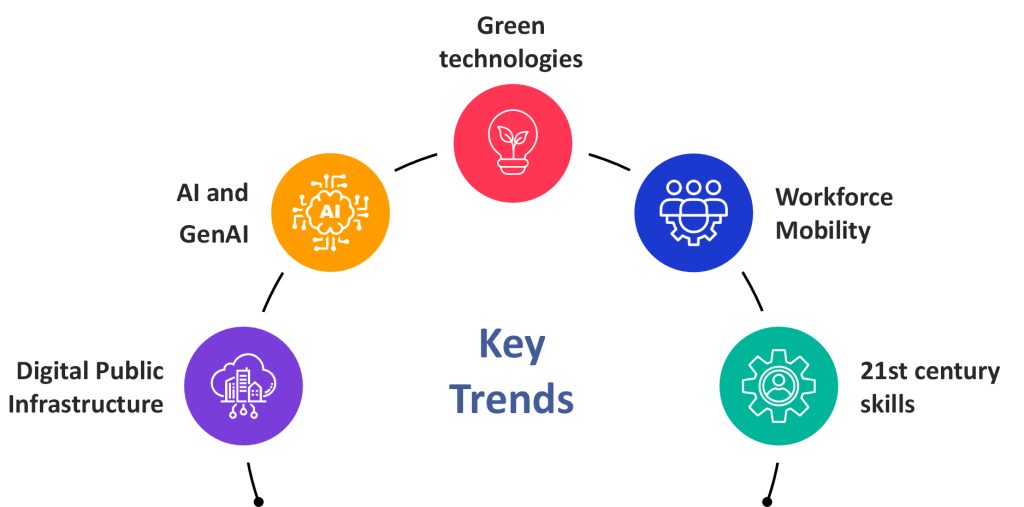
POSITIONING INDIA TO MEET THE SKILLED WORKFORCE DEMANDS OF 2030
Journey of Skill Development Mission in India:
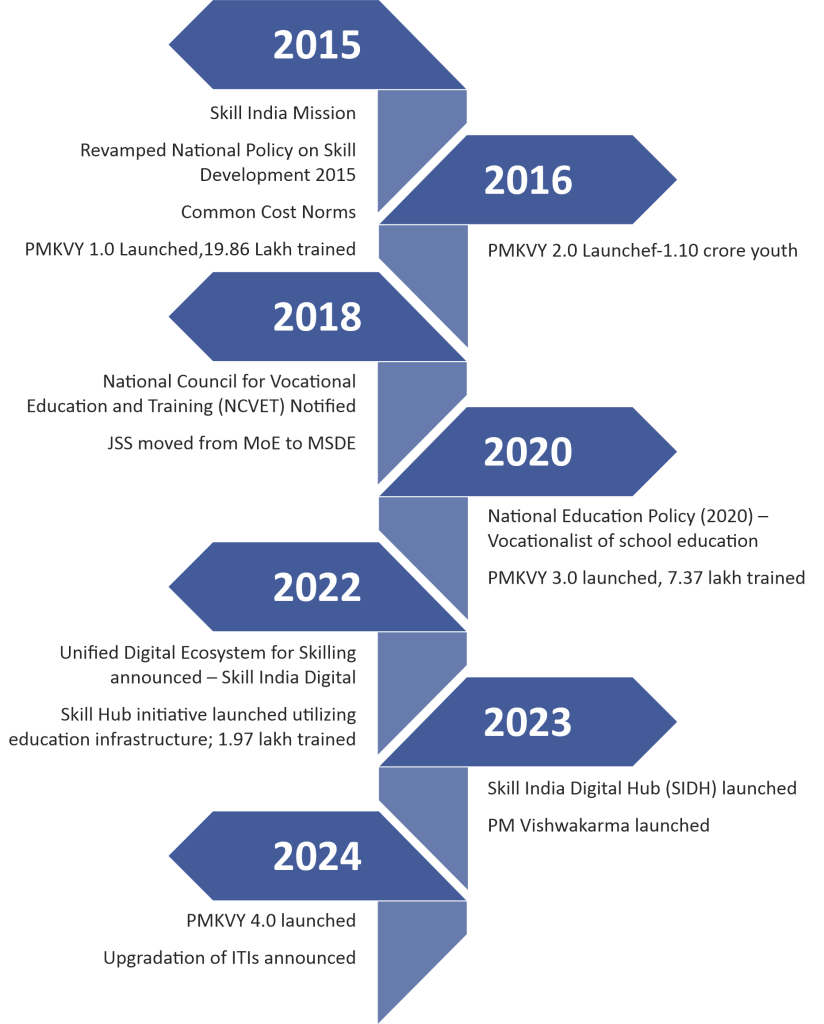
DOMAINS WITH MORE EMPLOYABILITY TALENT
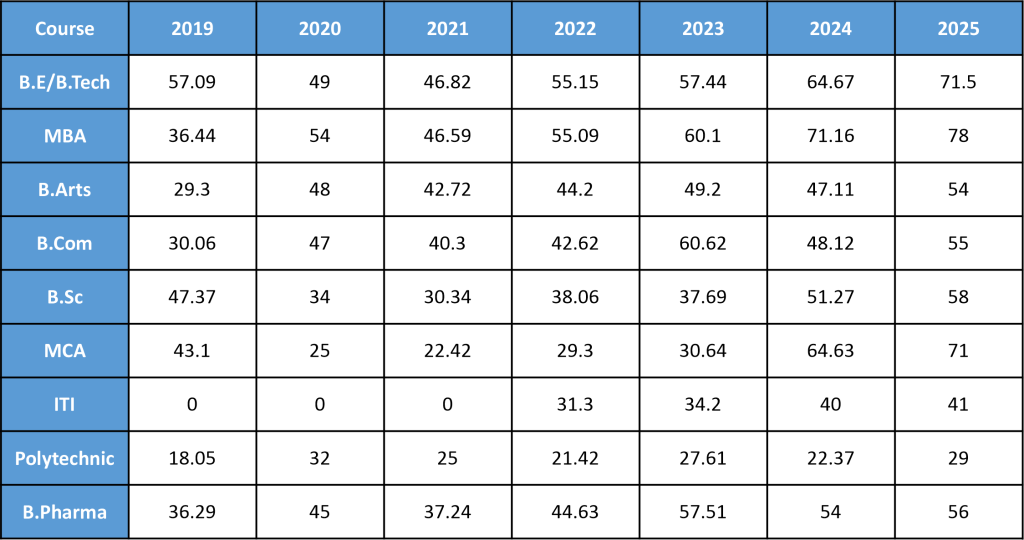
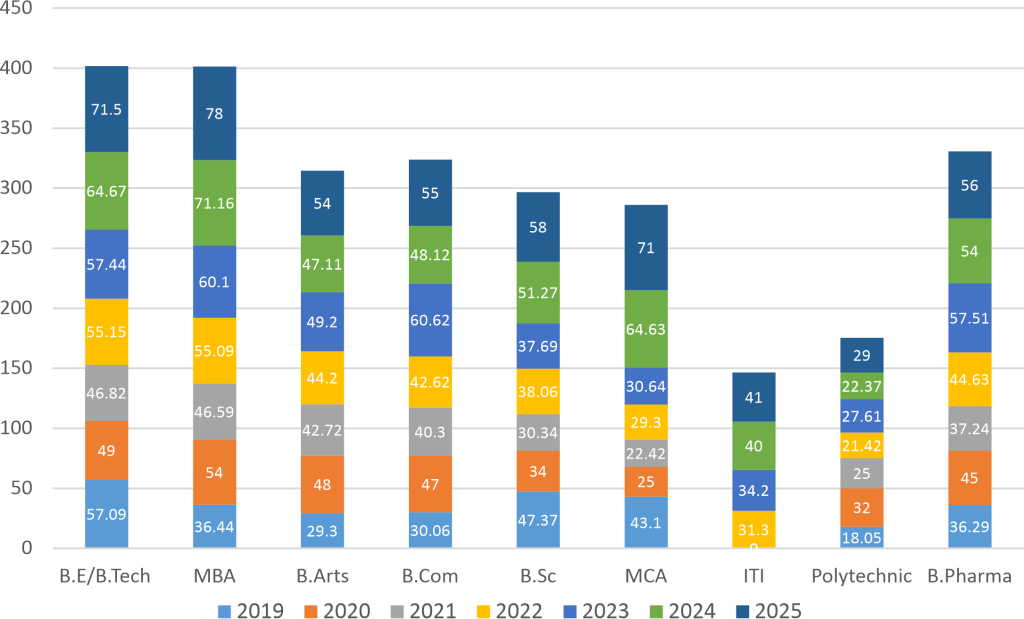
STATE WISE HIGHEST EMPLOYABILITY
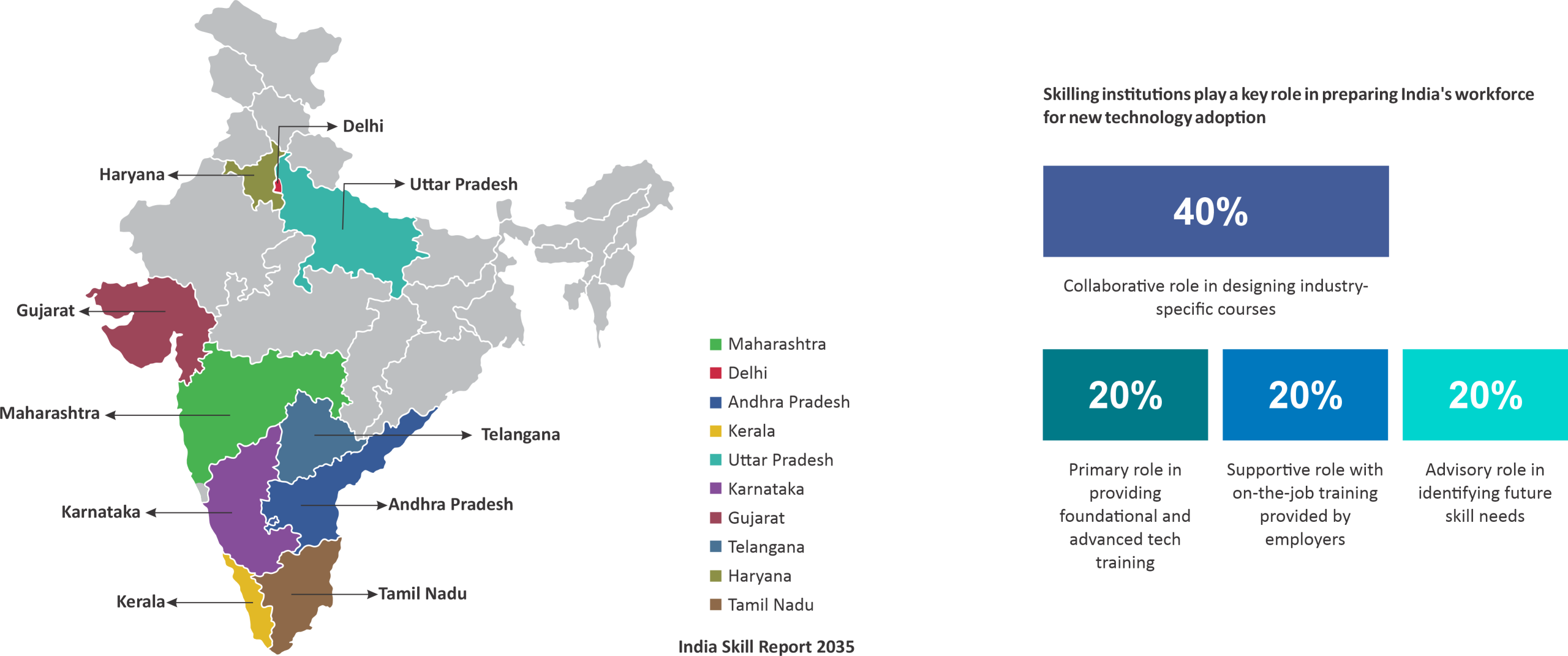
Over the years, India has seen a remarkable transformation in its higher education ecosystem. The number of Higher Education Institutions (HEIs) has grown significantly, increasing by 13.8% from 51,534 in 2014-15 to 58,643 in 2022-23. This expansion reflects the country’s commitment to making higher education more accessible and diverse. Education has always been a key priority for the government and with the vision to make India a global education hub, the Union Budget 2025-26 introduces innovative initiatives. Focused on expanding medical seats, enhancing skilling infrastructure and growing IITs, these measures aim to provide more opportunities and equip youth with essential skills for the future.
- Growth in Medical Education and Workforce: Medical Colleges grew from 499 in FY19 to 780 in Fy25.
- Growth of Indian Institutes of Technology (IITs): The number of IITs increased from 16 in 2014 to 23 in 2023.
- Growth of Indian Institutes of Management (IIMs): The number of IIMs grew from 13 in 2014 to 20 in 2023.
- Expansion of Universities: The number of Universities grew from 723 in 2014 to 1,328 in 2025.
- Increase in Higher Education Institutions (HEIs): Total HEIs increased from 51,534 in 2014 to 67, 902 in 2025
Looking ahead, the future of jobs in India, particularly within manufacturing, FMCG, healthcare, energy, and infrastructure, will be significantly shaped by emerging technologies, global workforce mobility, and future-ready policies.
Manufacturing
- Market size projected to reach US$1 trillion by 2025
- CAGR growth rate of 3.32% expected 2024-2029
- Currently employs around 27.3 million people
Healthcare
- Indian healthcare market was valued at approximately US$ 98.98 billion in 2023
- Projected CAGR of 8% from 2024 to 2032
- One of the largest employers in India, employing 7.5 million people in 2024
Energy
- India is the 3rd largest producer and consumer of electricity worldwide in April 2024
- 2.69% of the total FDI inflow in India between April 2000 and March 2024
- Jobs projected to reach 139 million globally by 2030
FMCG
- 10% of India’s GDP comes from the FMCG sector
- Indian food processing market expected to reach US$547.3 billion by 2028
- Industry predicted to develop at a CAGR of 7-9%
Infrastructure
- FDI in construction (infrastructure) stood at US$ 33.91 billion between April 2000-March 2024
- Union Budget 2024-25 has increased capital investment outlay for infrastructure, which would be 3.4 % of GDP
- Infrastructure is a key enabler in helping India become a US$26 trillion economy.
FUTURE OF JOBS FOR EVOLVING 2030 WORKFORCE IN INDIA
Manufacturing
- AI & Robotics technician
- Industrial Internet of Things (IIoT)
- Sustainable Manufacturing Engineer
- Digital Supply Chain Analyst
- Data Privacy and Cyber Security Manager
- Maintenance Technicians
- Design Engineers
Welders
Digital Construction Engineers
Healthcare
- Health Data Analyst
- Genomic Counselor
- Telemedicine Coordinator
- Digital Health Specialist
- AI healthcare Ethicist
- Caregivers
- Geriatric Caregivers
- Mental wellness experts
- Energy Conservation-alists
- Remote Patient Monitoring Specialists
Infrastructure
- AI and Machine Learning Specialists
- Renewable Energy Technicians
- Sustainable Infrastructure Engineers
- Smart City Planners
- Warehousing operators & technicians
- CNC machine operators
- Research & Development (R&D)
- Ground Liaison Officers
Energy
- Renewable Energy Technicians
- Smart Grid Analyst
- Sustainability Managers
- Carbon Capture Technician
- Audit Manager
- Environment health safety specialist
- Supply chain Analyst
- Social Impact Manager
- Compliance Manager
- Green Supply Managers
- Sensitivity Analyst
FMCG
- Data Scientist
- AI and Robotics Technician
- Digital Marketing Specialist
- Sustainability Manager
- E-commerce Strategist
- Computer operators
- Supply Chain Analyst
- Data Visualizer
- Data Engineers
- Omni Channel Specialist
- Sensitivity Analyst
FUTURE OF JOBS SKILL REQUIRED FOR EVOLVING 2030 WORKFORCE IN INDIA
Manufacturing
- Robotics programming and maintenance
- Advanced analytics and data interpretation
- Internet of Things (IoT) and connectivity
- Advanced digital literacy
- Soft skills (e.g., problem-solving, communication)
Healthcare
- Non-tech skills like communication, empathy and problem-solving
- Digital Literacy and Health Informatics
- AI and Machine Learning Proficiency
- Telehealth technology
- Genomic and Personalized Medicine Knowledge
Infrastructure
- Expertise in sustainable design and green technologies
- Understanding of advanced materials and construction techniques
- Robotics and Automation
Energy
- Expertise in Renewable Energy Technologies
- Skills in Energy Data Analytics and AI
- Proficiency in Energy Storage Solutions
- Knowledge of Environmental and Energy Policy
FMCG
- Sustainable Business Practices and Green Technologies
- Consumer Behavior Research and Insights
- Data Analysis and Interpretation
- Digital Literacy and E-commerce Management
- Supply Chain and Logistics Optimization
India’s Growing Role in Meeting Global Skilled Workforce 2030 Demands
India’s large, youthful, and increasingly skilled workforce positions the country as a pivotal player in the global talent ecosystem. With a median age of 32, the employability of India’s talent is also on the rise, successively emerging as a top destination for recruiters across industries. As countries worldwide grapple with labor shortages, technological disruption, and evolving workplace demands, India has the opportunity to solidify its role as a leading exporter of talent and a hub for innovation. By continuing to invest in education, technology, and workforce development, India can harness the full potential of its human capital, address critical global skill shortages, and play a central role in shaping the future of work.
India has emerged as a premier source of global talent, particularly in technology and healthcare. Since June 2021, international job searches directed toward India have surged by 60%, largely driven by opportunities in the technology, engineering, and digital services sectors. This trend aligns with India’s robust economic trajectory, with the International Monetary Fund projecting a 7% growth rate for FY 2024–25—fueling job creation across industries. The country’s thriving IT sector, which contributed 7.4% to GDP in FY 2022, is on track to reach 10% by 2025. Complementing this growth, over half of India’s secondary and tertiary students are expected to participate in vocational training by 2025, ensuring a consistent pipeline of industry-ready professionals to meet rising global demand.
Talent demand across the top 10 countries – Leading The Future India’s Vision
As global demand for specialized skills accelerates, India is uniquely positioned to meet this need through its expansive and evolving talent pool—particularly in sectors such as technology, healthcare, finance, and sustainability. The emerging roles in these areas highlight the key trends and sectoral shifts expected to define the global workforce by 2030. These roles not only reflect the evolving priorities of developed economies but also address the growing needs of emerging markets, driven by rapid technological advancement, economic recovery, and ongoing workforce transformation.
Sector wise demand JOBS for 2030 Global Skilled Professional Workforce:
Technology and IT
- AI Engineer
- Machine Learning Specialist
- Data Scientist
- Cloud Engineer
- Cybersecurity Expert
- DevOps Engineer
- Software Developer
- Mobile Application Developer
- Full-stack Developer
- UI/UX Designer
- Business Intelligence Analyst
- Robotics Engineer
- Blockchain Developer
- IoT Specialist
- Automation Specialist
Health Care and Biotechnology
- Healthcare Data Analyst
- Medical Researcher
- Clinical Data Scientist
- Biotech Engineer
- Pharmaceutical Specialist
- Healthcare It Specialist
- EHR (Electronic Health Records) Specialist
- Health Tech Innovator
- Genomics Specialist
- Clinical Trial Manager
- Public Health Analyst
E-commerce
- E-commerce Manager
- SEO/SEM Specialist
- Digital Marketing Strategist
- Social Media Manager
- Content Creator
- Affiliate Marketing Manager
- Conversion Rate Optimization (CRO) Specialist
- Customer Success Manager
- Product Manager (E-commerce)
Sustanibility
- Renewable Energy Engineer
- Sustainability Consultant
- Environmental Data Analyst
- Energy Efficiency Specialist
- Green Technology Specialist
- Clean Energy Project Manager
- Sustainable Design Architect
- Carbon Footprint Analyst
- Circular Economy Specialist
- Environmental Policy Advisor
Finance and FinTech
- Financial Analyst
- Fintech Specialist
- Blockchain Analyst
- Investment Banker
- Financial Planner
- Cryptocurrency Consultant
- Risk Manager
- Regulatory Compliance Officer
- Wealth Management Advisor
Education and Training
- Edtech Developer
- Curriculum Designer
- Online Learning Specialist
- Instructional Designer
- Corporate Trainer
- Education Consultant
- Learning Management System (LMS) Administrator
- Digital Learning Facilitator
- Talent Development Specialist
Manufacturing and Automation
- Automation Engineer
- Industrial Robotics Engineer
- Manufacturing Data Analyst
- Production Manager
- Supply Chain Analyst
- 3D Printing Engineer
- Process Optimization Specialist
- Lean Manufacturing Consultant
Cybersecurity
- Cybersecurity Analyst
- Cybersecurity Consultant
- Network Security Engineer
- Penetration Tester
- Incident Response Specialist
- Cloud Security Architect
- Security Operations Center (SOC) Analyst
Legal and Regulatory
- Legal Advisor (Tech)
- Compliance Officer
- Intellectual Property Lawyer
- Contract Manager
- Data Protection Officer
- Corporate Governance Specialist
Sales and Customer Engagement
- Sales Growth Manager
- Customer Relationship Manager
- Client Success Specialist
- Account Executive
- Sales Enablement Specialist
- Business Development Manager
- Customer Support Specialist
Mapping India’s Talent to the World’s Needs: A New Era in Global Talent Mobility:
India’s strategic role in the global labor market is becoming increasingly evident as its highly skilled workforce continues to fill critical talent gaps across sectors such as IT, healthcare, engineering, and cybersecurity. With the right focus on enhancing global skills mobility, strengthening public infrastructure, and aligning its education system with international workforce demands, India has the potential not only to boost its economic growth through foreign remittances but also to establish itself as a global leader in shaping the future of work.
As nations across Southeast Asia, Sub-Saharan Africa, the Middle East, Australia, and Europe face acute labor shortages, India’s professionals are emerging as a vital resource. The ongoing digital transformation and infrastructure expansion in these regions are amplifying the need for expertise in fields such as artificial intelligence, cybersecurity, data science, and renewable energy areas where Indian talent has already demonstrated global competitiveness.
The sustained global demand for professionals in IT, healthcare, engineering, and clean energy underscores India’s significance in bridging the world’s skill gaps. Government-led initiatives like Skill India and the National Education Policy (NEP) are actively fostering employment-oriented learning, equipping India’s youth with the capabilities to meet evolving global workforce needs. As India continues to invest in talent development and global alignment, it is well-positioned to lead a new era of international talent mobility.
Generation & Skill Development Efforts by the Government of India:
The Government of India has implemented various initiatives for employment generation and skill development, including the Aatmanirbhar Bharat package, Aatmanirbhar Bharat Rojgar Yojana (ABRY), PM Svanidhi Scheme, Pradhan Mantri Mudra Yojana (PMMY), Production Linked Incentive (PLI) Scheme, PM GatiShakti, Prime Minister’s Employment Generation Programme (PMEGP), Mahatma Gandhi National Rural Employment Guarantee Scheme (MGNREGS), Deen Dayal Antyodaya Yojana-National Urban Livelihoods Mission (DAY-NULM), National Apprenticeship Promotion Scheme (NAPS), Pradhan Mantri Kaushal Vikas Yojana (PMKVY), Jan Shikshan Sansthan (JSS) Scheme, Craftsman Training Scheme (CTS), Make in India, Start-up India, Stand-up India, Digital India, and Housing for All.
India’s Make in India Strategy: Driving Employment and Economic Resilience Amid Global Tariff Wars
Amid escalating global tariff wars, particularly between major economies, India is intensifying its promotion of the Make in India initiative as a dynamic strategy to reshape domestic policies, fostering self-reliance in manufacturing and reducing dependency on imports. By imposing targeted tariffs on foreign goods, enhancing incentives for local production through schemes like the PLI, and streamlining regulations to attract foreign direct investment, India aims to bolster key sectors such as electronics, pharmaceuticals, and automobiles, thereby creating millions of jobs, protecting local industries from unfair competition, and positioning the country as a resilient global manufacturing hub capable of navigating trade disruptions while driving economic growth toward the 2030 vision. Due to these efforts, employment has already increased substantially, with the PLI schemes generating over 1.2 million jobs by March 2025 and attracting investments worth Rs 1.76 lakh crore, and it is projected to rise further through related initiatives like the Employment Linked Incentive (ELI) scheme, which aims to create up to 35 million additional jobs over the next two years starting from August 2025.7
Alongside these, India’s emphasis on Vocal for Local as a key strategy, coupled with its calibrated response to the ongoing tariff war, is set to further strengthen domestic manufacturing and accelerate the Make in India momentum.
References
- Indian Skill Report 2025
- Future of Jobs in India 3.0
- World Economic Forum, Future of Jobs Report 2023
- Union Budget 2025-26
- Economic Survey 2024-25
- Measuring the Pulse on Indian Education
- https://economictimes.indiatimes.com/news/economy/policy/pli-schemes-attract-rs-1-76-lakh-cr-investment-create-12-lakh-jobs-govt/articleshow/122070850.cms?from=mdr
